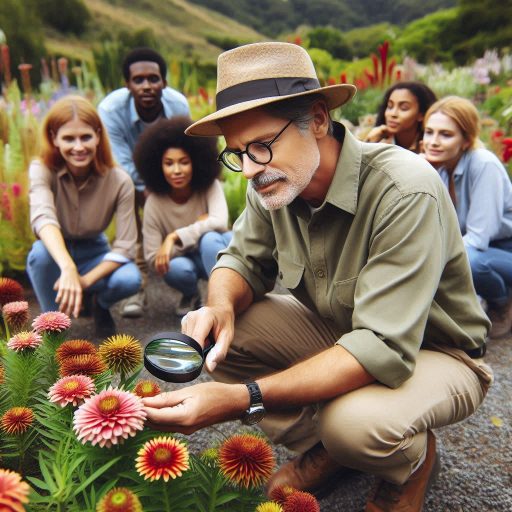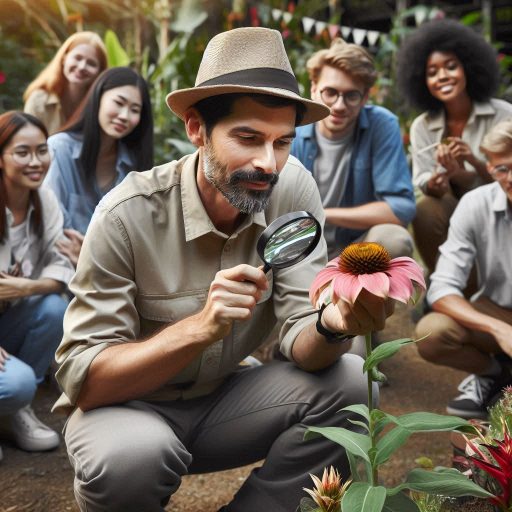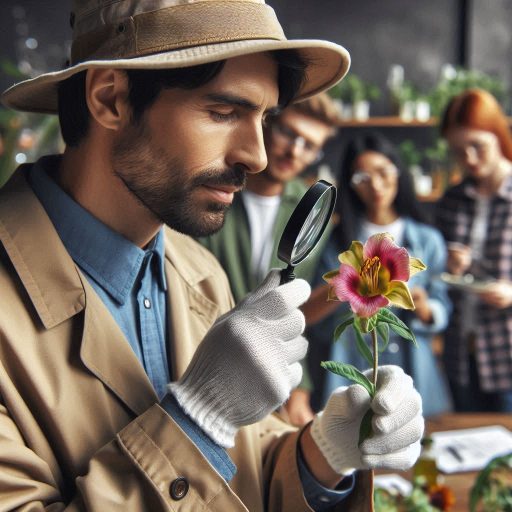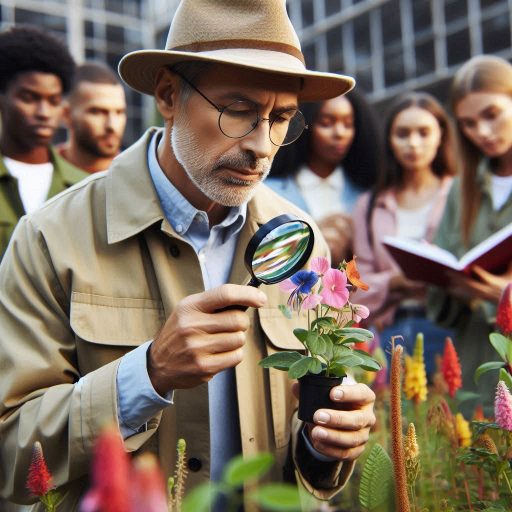Introduction
Botany internships offer students a unique opportunity to immerse themselves in the field of plant sciences.
These internships provide invaluable hands-on experience essential for aspiring botanists.
Engaging in practical work enhances your understanding of plant biology, ecology, and conservation, allowing you to bridge the gap between theory and application.
Internships can take place in various environments, including botanical gardens, research institutions, universities, and environmental organizations.
In these settings, interns learn to identify plant species, collect data, and analyze ecological trends.
You will gain exposure to laboratory techniques such as DNA extraction, chromatography, and microscopy.
Additionally, these experiences can enhance your resume, making you a more competitive candidate for future positions.
Networking with professionals in the field can open doors to career opportunities, internships, and mentorships.
Exploring internships not only builds your expertise but also ignites your passion for botany.
Botany internships play a crucial role in shaping the future of students passionate about plant sciences.
Gaining practical experience equips you with essential skills and knowledge, preparing you for a successful career in botany.
Overview of Botany Internships
Botany internships provide valuable hands-on experience for students and aspiring botanists.
These internships allow individuals to work closely with plants, ecosystems, and research projects.
By participating in these programs, interns can enhance their skills and knowledge in botany.
Definition of Botany Internships
Botany internships are practical work experiences that focus on plant biology.
They offer students a chance to apply theoretical knowledge in real-world settings.
Internships typically involve working under the supervision of experienced botanists.
This mentorship helps interns gain practical skills and insights into the field.
Interns often engage in various activities, including plant identification, data collection, and laboratory work.
Different Types of Internships Available
Various types of botany internships cater to diverse interests and career goals.
Some internships focus on research, allowing interns to assist in scientific studies.
These positions often involve fieldwork, data analysis, and literature reviews.
Other internships may emphasize conservation, where interns work to protect endangered species and restore habitats.
This type of internship often involves collaboration with environmental organizations.
Educational institutions also offer internships for students in botany programs.
These programs provide students with academic credit while gaining practical experience.
Some internships are available in botanical gardens, where interns can learn about plant care and cultivation.
Additionally, industry internships allow interns to explore careers in horticulture, agriculture, and plant biotechnology.
Benefits of Participating in Internships for Budding Botanists
Participating in botany internships offers numerous benefits for aspiring botanists.
Firstly, internships provide valuable hands-on experience, making academic knowledge more applicable.
Interns learn essential skills, such as plant identification, research methodologies, and laboratory techniques.
These experiences can enhance resumes and make candidates more competitive in the job market.
Secondly, internships allow individuals to network with professionals in the field.
Interns often connect with experienced botanists, researchers, and conservationists.
These connections can lead to job opportunities and mentorship, which are crucial for career growth.
Networking also helps interns gain insights into various career paths within botany.
Thirdly, internships foster personal and professional growth.
Interns develop critical thinking, problem-solving, and teamwork skills.
These experiences can boost confidence and help interns discover their passions within botany.
Additionally, internships allow individuals to explore specific areas of interest, such as plant ecology or agricultural practices.
Finally, internships can inspire a deeper commitment to environmental conservation.
Working on projects that protect and restore ecosystems can motivate interns to pursue careers in this field.
As they witness the impact of their work, interns often become advocates for sustainable practices.
Botany internships play a crucial role in shaping the future of budding botanists.
They provide hands-on experience, networking opportunities, and personal growth.
By participating in these internships, aspiring botanists can pave the way for successful careers.
Finding Botany Internships
When it comes to finding botany internships, several effective strategies can help you secure hands-on experience in this exciting field.
Whether you are a college student or a recent graduate, exploring internships can enhance your practical skills.
Internships provide valuable experience that boosts your professional development.
Take the initiative to seek out opportunities that align with your career goals.
By doing so, you can effectively launch your career and gain essential skills for success.
This guide will walk you through various methods to find and apply for botany internships, ensuring you make the most of your search.
Researching Available Opportunities
Start by conducting thorough research on various organizations that offer botany internships.
This may include botanical gardens, research institutions, universities, conservation agencies, and government organizations.
Each of these entities often has unique programs designed to engage interns in hands-on projects.
- Websites and Job Boards: Visit their official websites to learn more about their internship offerings.
Search for sections on internships or volunteer opportunities.
These sections usually detail requirements and application deadlines.
You can find information about the types of work or research projects available. - Online Job Platforms: Explore popular job boards such as Indeed, Glassdoor, and LinkedIn, where internships are frequently listed.
You can filter your search by location, duration, and type of work to find opportunities that best fit your goals. - Reviews and Testimonials: Look for reviews or testimonials from past interns on websites like Glassdoor or through professional networking sites.
These insights can help you gauge the overall experience, the skills you can gain, and the work environment at each organization. - Targeted Searches: Consider focusing your search on specific sectors within botany, such as plant conservation, ecological restoration, or agricultural botany.
This targeted approach can help you identify internships that align with your interests and career goals.
Utilizing University Resources and Career Centers
Your university or college is an invaluable resource in your internship search.
Take advantage of the various support services they offer, which can significantly enhance your chances of landing a botany internship.
- Career Services Offices: Most universities have dedicated career services that provide assistance with job searching, resume writing, and interview preparation.
Schedule an appointment with a career advisor to discuss your interests in botany and receive personalized guidance. - Faculty Advisors: Don‘t underestimate the power of your professors and faculty advisors.
They often have industry connections and can provide insights into internship opportunities that may not be widely advertised.
Ask for recommendations or introductions to their professional contacts in the field. - Departmental Websites: Visit your department‘s website to find internship listings, research opportunities, or announcements about programs that focus on botany.
Many departments also host informational sessions about internships and career paths. - Career Fairs and Networking Events: Attend career fairs, networking events, and workshops focused on botany or environmental science.
Engage with professionals and peers in your field.
Seek opportunities to learn and connect with industry experts.
These events often feature organizations looking to hire interns, providing an excellent opportunity to connect directly with employers.
Networking with Professionals in the Field
Networking can play a crucial role in finding botany internships.
Building professional relationships can open doors to opportunities that may not be publicly advertised.
- Online Networking: Utilize platforms like LinkedIn to connect with professionals in the field of botany.
Follow organizations of interest and engage with their content.
You can also join relevant groups to share ideas and gain insights from established professionals. - Informational Interviews: Conduct informational interviews with professionals in botany.
Reach out via email or LinkedIn, expressing your interest in their work and asking for a brief conversation.
This not only helps you learn more about their career paths but can also lead to potential internship opportunities. - Conferences and Workshops: Attend conferences, seminars, or workshops related to botany.
These events are excellent opportunities to meet potential mentors, advisors, or employers.
Engaging in discussions and networking can significantly enhance your professional connections. - Online Forums and Groups: Join online forums, social media groups, or discussion boards dedicated to botany or environmental science.
Participating in these communities can help you stay updated on internship openings and trends in the field.
Actively seek out botany internships to gain valuable hands-on experience.
Conduct thorough research on available opportunities.
Utilize university resources effectively.
Network with professionals in the field to enhance your chances.
Internships enhance your resume and provide critical insights into your career path.
They help you develop essential skills and connections to succeed in botany.
Taking these steps will prepare you for a successful and fulfilling career in this vital area of environmental science.
Read: Essential Skills and Tools for Modern Chemists in America
Application Process
Applying for botany internships can be a competitive process.
To increase your chances of success, it‘s essential to adopt a structured and thorough approach.
Below is a detailed step-by-step guide designed to help you navigate the application process effectively.
Preparing a Strong Resume and Cover Letter
Highlight Relevant Coursework and Experience
Begin by crafting a compelling resume that emphasizes your educational background, particularly any coursework relevant to botany.
Include classes in plant biology, ecology, and environmental science.
Also, detail any research experience or projects that showcase your understanding of botany and plant sciences.
If you have participated in lab work or field studies, be sure to include those as well.
Showcase Extracurricular Activities
Don‘t forget to include any relevant extracurricular activities or volunteer work.
Participation in botanical gardens, environmental clubs, or conservation projects can demonstrate your commitment to the field.
Mention leadership roles, special projects, or any initiatives you took that relate to botany.
Customize Each Application
Tailor your resume and cover letter for each internship application.
Align your skills and experiences with the internship‘s requirements.
Show your enthusiasm for the specific position and organization.
A personalized application stands out and shows the employer that you are genuinely interested.
Professional Presentation
Use a professional format for both your resume and cover letter.
Ensure consistency in font style and size, and maintain clear section headings.
Before submission, proofread your documents carefully to eliminate any typographical or grammatical errors.
A polished application reflects your attention to detail and professionalism.
Tailoring Applications to Specific Internship Positions
- Conduct In-Depth Research: Before applying, research each internship opportunity thoroughly.
Understand the specific requirements and responsibilities outlined in the job description.
This knowledge will allow you to better tailor your application. - Align Your Qualifications: Once you‘ve grasped the internship‘s needs, align your qualifications and experiences with those requirements.
For example, if the internship emphasizes plant identification skills, highlight any relevant coursework, fieldwork, or experience that demonstrates your proficiency in this area. - Express Your Passion: In your cover letter, emphasize your passion for botany and how the internship aligns with your long-term career goals.
Discuss what excites you about the field, such as the opportunity to conduct research on native plant species or participate in conservation efforts.
Showcasing your passion will help convey your enthusiasm to potential employers. - Personalize Your Application: Personalize your application by mentioning specific projects or initiatives from the organization.
This shows you understand their mission and values.
Highlighting these details positions you as a candidate genuinely interested in contributing to their goals.
Meeting Deadlines and Following Application Instructions
- Track Deadlines: Maintaining a calendar of application deadlines for each internship can help you stay organized.
Note the submission dates and plan your application timeline accordingly.
Aim to submit your application well before the deadline to avoid last-minute stress. - Follow Application Instructions: Adhere strictly to all instructions provided by the internship program.
This includes formatting requirements, specific documents to submit, and methods of submission.
For instance, if the internship requests applications in PDF format, ensure your documents are saved and sent as such. - Double-Check Your Application: Before submitting, double-check that you have included all necessary documents and information requested in the application.
A missing document can lead to your application being overlooked, so ensure you meet all requirements. - Ask Questions When Needed: If you have any questions or need clarification on the application process, don‘t hesitate to reach out to the internship coordinator.
They are typically more than willing to assist you and provide additional guidance.
This proactive approach can demonstrate your commitment to the position.
Follow these comprehensive guidelines and dedicate the necessary time and effort to prepare a strong application.
Doing so significantly enhances your chances of securing a botany internship.
This experience will not only provide you with valuable hands-on knowledge in the field of botany but also help you build a strong foundation for your future career.
Remember, every internship application is a stepping stone towards achieving your professional aspirations in the world of botany.
Read: The Role of Chemists in US Environmental and Sustainability Efforts

Skills gained through botany internships
Hands-On Experience in Plant Research and Identification
One of the primary benefits of botany internships is gaining practical experience in plant research and identification.
These internships allow students to immerse themselves in real-world environments, significantly deepening their understanding of plant species and their ecological roles.
By engaging directly with plants in various habitats, students can apply theoretical knowledge from their coursework to practical situations.
This hands-on experience fosters a comprehensive grasp of plant taxonomy, classification, and ecology.
Interns learn to recognize various plants in their natural environments, which enhances their skills in plant taxonomy and classification.
They identify plant families, species, and subspecies, using field guides and taxonomic keys.
Additionally, they gain experience in differentiating between similar species, which can be particularly challenging.
This exposure helps solidify concepts learned in the classroom while also promoting observational skills that are crucial for future research and fieldwork.
In many internships, students participate in ongoing research projects.
They may collect samples, document findings, and even contribute to publications.
This involvement provides them with a sense of accomplishment and real-world application of their studies.
Interns gain valuable insights into how plant research contributes to larger scientific questions, such as biodiversity conservation and ecosystem management.
This experience is instrumental in preparing students for advanced studies or careers in botany and related fields.
Learning Laboratory Techniques and Fieldwork Methods
Internships in botany offer students the opportunity to learn essential laboratory techniques and fieldwork methods.
These skills are vital for conducting effective research in plant biology and ecology.
Interns gain hands-on experience with sampling, preparation, and analysis of plant specimens.
They learn how to use specialized tools and equipment, such as microscopes, spectrophotometers, and DNA sequencers.
Mastering these techniques enhances their proficiency in collecting, analyzing, and interpreting data accurately.
In laboratory settings, interns often conduct experiments that require precise measurement and meticulous attention to detail.
They learn techniques such as chromatography for analyzing plant pigments and PCR for amplifying DNA.
These experiences are fundamental for understanding how laboratory analysis contributes to broader research goals.
Additionally, interns become familiar with data management and statistical analysis software, which are crucial for interpreting research findings.
Fieldwork methods are equally important in botany internships.
Students often conduct surveys, collect ecological data, and monitor plant health in natural settings.
They learn how to navigate diverse environments, from forests to wetlands, while employing sustainable practices.
Understanding these methods equips interns with the skills needed for ecological restoration and conservation efforts.
This dual focus on laboratory and field techniques provides a holistic view of plant biology research.
Transform Your Career Today
Unlock a personalized career strategy that drives real results. Get tailored advice and a roadmap designed just for you.
Start NowDeveloping Critical Thinking and Problem-Solving Skills
Botany internships also foster critical thinking and problem-solving skills essential for success in plant biology.
Interns face complex research questions and challenges throughout their experiences.
For instance, they may investigate how environmental factors influence plant growth or study the impacts of invasive species on local ecosystems.
These scenarios require interns to think critically and creatively to devise effective solutions.
In many cases, students must design experiments or develop research protocols, which promotes analytical thinking.
They learn to formulate hypotheses, design experiments, and analyze data.
This iterative process enhances their ability to approach scientific problems methodically.
They may also engage in discussions with mentors and peers, providing opportunities for collaborative problem-solving.
This environment encourages them to brainstorm ideas and analyze various approaches to find solutions.
Moreover, internships often involve troubleshooting unexpected issues.
For instance, interns may encounter equipment malfunctions or unforeseen variables affecting their research.
These challenges teach resilience and adaptability, key traits for any scientist.
Through these experiences, students cultivate a mindset geared toward innovation and adaptability in scientific research.
Botany internships present valuable opportunities for students to gain hands-on experience and develop essential skills in plant biology.
Students enhance their knowledge and expertise in botany through participation in these programs.
They learn research techniques, field methods, and plant identification skills.
The comprehensive nature of these internships fosters a deep understanding of plant biology, ecology, and conservation.
Additionally, these internships significantly boost students’ confidence in their abilities to conduct research and contribute to the field.
As they tackle real-world challenges and navigate complex scientific questions, they grow more self-assured in their skills and knowledge.
Read: Day in the Life: An Environmental Scientist‘s Typical Day
Gain More Insights: Impact of Urbanization on Water Resources
Professional Development
Building a professional network in the field of botany
Botany internships offer invaluable opportunities for professional development.
Interns can build a strong professional network within the field.
Networking helps establish connections with fellow interns, botanists, and industry professionals.
These connections often lead to future job opportunities and collaborations.
Engaging with a diverse group of professionals can enhance an intern’s understanding of the field.
Attending conferences and workshops further expands networking opportunities.
Interns can meet established botanists who share their experiences and insights.
These interactions provide guidance and inspiration for aspiring botanists.
Receiving mentorship from experienced botanists
Receiving mentorship from experienced botanists is another significant benefit of internships.
A mentor can offer personalized advice and support throughout an intern‘s journey.
They can help interns navigate the challenges of the botanical field.
Mentors also provide valuable feedback on research projects and career goals.
Mentorship fosters a deeper understanding of various botanical disciplines.
Interns gain insight into plant biology, ecology, and conservation.
This knowledge helps shape their career aspirations and interests.
A mentor‘s experience can illuminate potential career paths within botany.
Internships also allow interns to explore various areas of botany.
They can work in research, horticulture, conservation, or education.
This exposure helps interns identify their passions and strengths.
Understanding different career paths allows them to make informed decisions about their futures.
Gaining insight into potential career paths within the field
Additionally, internships often include hands-on experience in the field.
Interns can apply theoretical knowledge in practical settings.
This real-world experience enhances their resumes and makes them more competitive.
Employers value candidates with practical experience in their respective fields.
Internships also provide opportunities to learn essential skills.
Interns can develop skills in plant identification, data collection, and laboratory techniques.
These skills are crucial for success in botanical careers.
Interns can also learn about project management and teamwork through collaborative efforts.
Furthermore, internships can help interns stay updated on industry trends.
They gain insights into the latest research, conservation efforts, and technological advancements.
This knowledge is crucial for future career success.
Being informed about trends allows interns to align their goals with industry demands.
Botany internships significantly contribute to professional development.
They facilitate networking, mentorship, and hands-on experience.
Interns build essential connections, receive guidance from experts, and explore diverse career paths.
By engaging actively in internships, they can position themselves for successful careers in botany.
Ultimately, these experiences equip interns with the skills and insights necessary for a fulfilling professional journey.
Read: The Impact of Technology on the Chemist Profession in the US
Tips for a successful internship experience
Tips for a Successful Internship Experience
Internships in botany offer valuable hands-on experience.
They serve as a bridge between academic knowledge and real-world application.
To make the most of your internship, consider these essential tips to ensure a successful and enriching experience.
Set Clear Goals and Objectives
Start your internship by defining your goals.
Reflect on what you want to achieve during this time.
Are you interested in plant biology, conservation, or research? Setting specific objectives will help you focus your efforts.
Identify skills you wish to develop, such as laboratory techniques, fieldwork, or data analysis.
Discuss your goals with your supervisor early on.
This conversation can align expectations and clarify your responsibilities.
Be open about your interests and desired outcomes, as this will help your supervisor guide your learning effectively.
Revisiting your goals throughout the internship helps you stay on track.
Schedule regular check-ins with your supervisor to assess your progress.
Adjust your objectives as needed to ensure continuous growth.
Setting clear milestones will give you a sense of accomplishment and direction.
Take Initiative
Taking initiative is vital for a successful internship.
Don‘t wait for tasks to be assigned to you.
Instead, seek out additional responsibilities whenever possible.
Being proactive demonstrates your enthusiasm and dedication.
Volunteer for projects that interest you, even if they push you outside your comfort zone.
Engaging with different aspects of botany broadens your understanding of the field.
This hands-on experience allows you to apply theoretical knowledge in practical settings.
Look for opportunities to collaborate with colleagues on ongoing research.
Ask questions and offer your assistance with their projects.
Building relationships with fellow interns and staff can lead to valuable networking.
Collaborating with others can also enhance your learning experience, as you can gain new perspectives and insights.
Seek Learning Opportunities
Your internship is a chance to learn as much as possible.
Attend seminars, workshops, or field trips organized by your institution.
These events provide unique insights into various aspects of botany.
Engage actively during these sessions by asking questions and participating in discussions.
This involvement demonstrates your interest and commitment to learning.
Ask to shadow experienced professionals during their daily activities.
Observing their work can deepen your understanding of practical applications.
Don‘t hesitate to ask them about their career paths, challenges, and successes.
This knowledge can guide your future decisions in the field of botany.
Explore the laboratory or research facility during breaks to familiarize yourself with available resources.
Being proactive in seeking out learning opportunities enhances your experience.
Make it a habit to review scientific journals or articles related to your work.
This knowledge will contribute to more meaningful discussions with your colleagues and supervisors.
Request Feedback
Feedback is crucial for personal and professional growth.
Regularly seek feedback from your supervisor and mentors.
Create a structured approach to solicit their insights on your work.
Ask them how you can improve your performance and skills.
Constructive criticism provides insight into areas needing development.
Be open to suggestions and use them to refine your approach to tasks and projects.
Show appreciation for their input by applying their suggestions.
Keeping track of feedback will help you measure your progress.
Periodically review this feedback to identify patterns and areas for continuous improvement.
This process fosters a growth mindset, crucial for your professional journey.
Build Relationships
Networking is essential during your internship.
Establish connections with your colleagues and mentors.
Attend social events and informal gatherings to foster relationships.
Engage in conversations and show genuine interest in their work.
A strong professional network can open doors for future opportunities.
Networking not only enhances your current experience but can also lead to job opportunities after graduation.
Engaging with others in your field increases your understanding of potential career paths.
Consider reaching out to alumni from your institution who have worked in similar roles.
They can provide valuable insights and guidance, as well as share their experiences.
Reflect on Your Experience
Take time to reflect on your internship regularly.
Consider what you‘ve learned and how it aligns with your goals.
Reflecting on your experiences helps reinforce learning and prepares you for future endeavors.
Document your experiences in a journal to track your growth.
This practice allows you to articulate your achievements and challenges, providing a useful resource for future job applications.
Set aside time each week to review your progress and experiences.
Think about what worked well and what didn‘t.
This reflective practice will enhance your self-awareness and help you identify areas for improvement.
Learn More: Meteorologist Job Description: Duties and Responsibilities
Conclusion
Gaining hands-on experience through botany internships is crucial for aspiring botanists.
These opportunities provide practical skills and enhance theoretical knowledge.
Internships allow students to work alongside experienced professionals in real-world settings, which fosters a deeper understanding of plant science and its applications.
Aspiring botanists should actively seek out internship opportunities.
Many organizations, including botanical gardens, research institutions, and environmental nonprofits, offer various positions.
These roles cater to diverse interests and career goals.
Each internship provides unique experiences that contribute to professional growth.
The skills and knowledge gained through internships are invaluable for future career success.
They help build confidence and prepare students for challenges in the field.
Internships enhance critical thinking and problem-solving abilities, which are essential in any scientific career.
Embrace these opportunities to grow and learn in the dynamic world of botany.
Your journey as a botanist can start with the right internship experience.
By gaining hands-on experience, you will be better equipped to make informed decisions and contribute meaningfully to the field.
Pursuing internships is a step toward realizing your potential as a successful botanist.
[E-Books for Sale]
The Big Book of 500 High-Paying Jobs in America: Unlock Your Earning Potential
$19.99 • 500 High-Paying Jobs • 330 pages
Explore 500 high-paying jobs in America and learn how to boost your career, earn more, and achieve success!
See All 500 High-Paying Jobs of this E-Book
1001 Professions Without a Degree: High-Paying American Jobs You Can Start Now
$19.99 • 1001 Professions Without a Degree • 174 pages
Discover 1001 high-paying jobs without a degree! Unlock career tips, skills, and success strategies for just $19.99!




